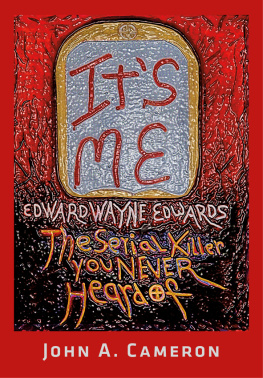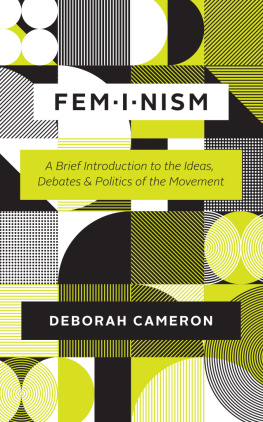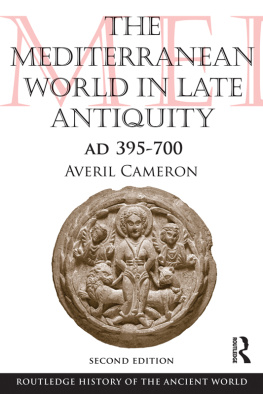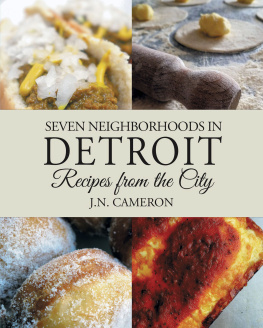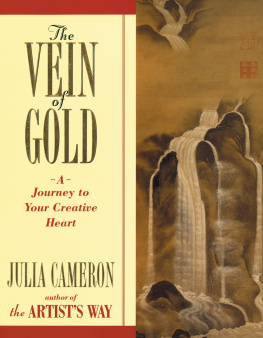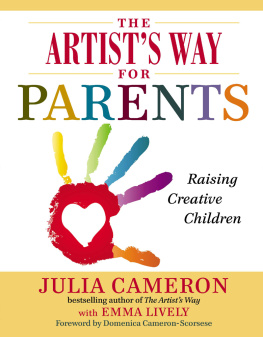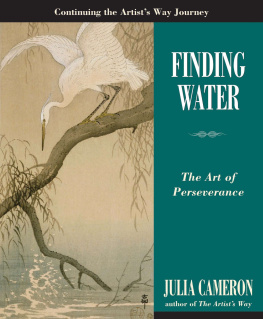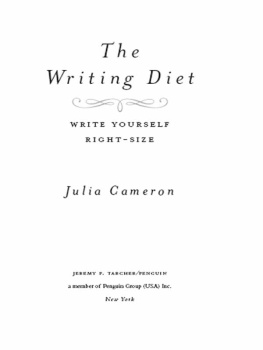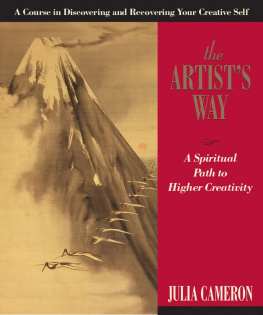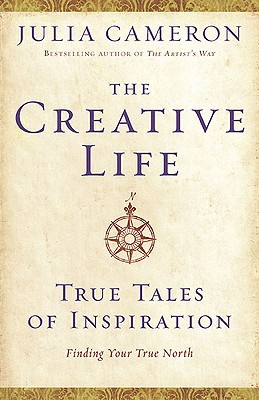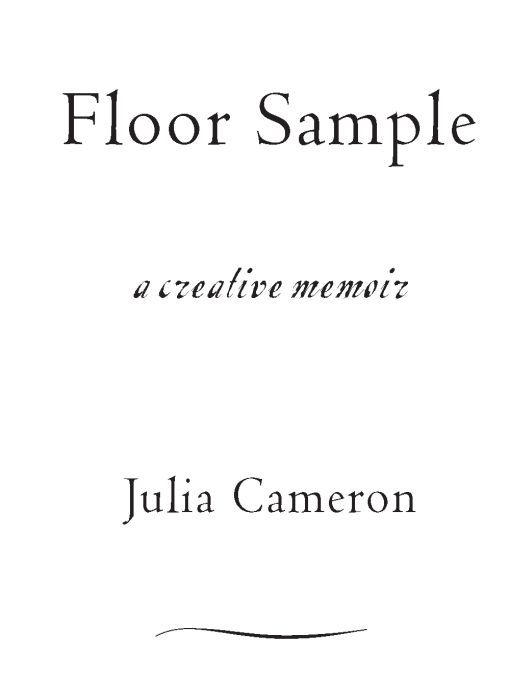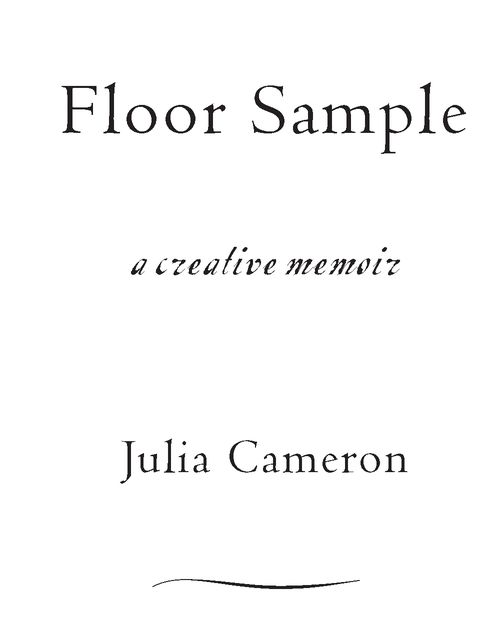Table of Contents
Also by Julia Cameron
NONFICTION
The Artists Way
Walking in This World
Finding Water
The Vein of Gold
The Right to Write
The Sound of Paper
Answered Prayers
Heart Steps
Blessings
Transitions
Prayers from a Nonbeliever
Letters to a Young Artist
How to Avoid Making Art (or Anything Else You Enjoy),
illustrated by Elizabeth Cameron
The Artists Way Morning Pages Journal
The Artists Date Book, illustrated by Elizabeth Cameron
Supplies, illustrated by Elizabeth Cameron
God Is No Laughing Matter
God Is Dog Spelled Backwards, illustrated by Elizabeth Cameron
Inspirations: Meditations from The Artists Way
The Writers Life: Insights from The Right to Write
The Artists Way at Work (with Mark Bryan and Catherine Allen)
Money Drunk/Money Sober (with Mark Bryan)
FICTION
Popcorn: Hollywood Stories
The Dark Room
PLAYS
Public Lives
The Animal in the Trees
Four Roses
Love in the DMZ
Avalon (a musical)
The Medium at Large (a musical)
Magellan (a musical)
POETRY
Prayers for the Little Ones
Prayers to the Nature Spirits
The Quiet Animal
This Earth (also an album with Tim Wheater)
FEATURE FILM
(as writer-director)
Gods Will
JEREMY P. TARCHER PENGUIN
a member of Penguin Group (USA) Inc.
New York
For those I have loved
ACKNOWLEDGEMENTS
I am deeply grateful to those who have shaped my life
and these pages.
WHY WE WRITE
There are many things which resist naming,
And that is why we write.
We write because language is slippery,
And the truth is.
We write because
The light we have to see by
Is always shifting
Never forget that writers are prophets.
We speak in tongues.
We testify.
We are for each other a believing mirror.
Our words make us visible.
Our listening makes us heard.
Never forget that writers are soldiers.
Our writing is the long march,
The walk into time.
Each word is a drum.
We sound it across great distances,
Reaching one another and ourselves.
Every poem is a days march.
A celebration more necessary than water or wine.
Every poem is a drink of blood.
Never forget that writing is an act of courage
Not on the days when it is simple and we discount it.
Not on the days when it is hard and we write like sand.
Our words are torches.
We pass them hand to hand
And mouth to mouth
Like a burning kiss.
Never forget to say thank you.
Every syllable is a grace.
J.C.
The late afternoon sky is pewter. Wind whips through the Manhattan canyons. In Central Park, a single large gingko tree stands golden against the glowering clouds. Underfoot are the thickly fallen leaves of maple, oak, and ash. Gusts of wind send the leaves dancing. Dog owners like myself hurry their charges on their rounds. It is nearly Thanksgiving, and the dark comes early.
Perhaps because of all my school years, fall for me is a time of beginnings. The short, steep days send me tumbling into my past. I am fifty-seven years of age, neither old nor young. My life has swept me along on its tide, but now, at the midpoint, it is time to pick my way along the shoreline, to see what of value has been washed up, which mementos should be pocketed and which cast aside. Mine has been a turbulent life. But it did not start out that way.
I grew up in Libertyville, Illinois, in a large yellow house in the woods. An oversized, overstuffed English cottage, the house was made of fieldstone and wood. Cold pried at the windows. Dark gathered in the surrounding trees. As early as late September, fires were built in the three fireplaces to ward off the chill. Just outside the front door stood a large maple tree. When its leaves turned crimson, my mother would carefully press the best between sheets of waxed paper. These leaves were then tacked on our kitchen bulletin board amid vivid charcoal drawings of Halloween.
Fall was fierce, but my mother domesticated it. As the wind stripped the trees, my mother made simmering pots of vegetable soup. She baked shortbreads and berry pies. As early as October, she began her holiday baking, filling the downstairs freezer with a dozen different Christmas cookies, divinity, and fudge.
Lets go to your house, my school friends would say. Of course they did. Homemade cookies and frosty milk were staple after-school fare. If we felt daring, we raided the freezer. Christmas cookies tasted best a month or two before their time. Whos been after the Christmas cookies? my mother would interrogate us, but she always seemed secretly pleased by the chance to bake some more.
When winter displaced fall, reading spots in front of the fireplaces were at a premium. The best locale was in our living room. There the reader could loll on thick caf-au-lait carpeting. A mesh screen protected errant bookworms from flying sparks. Prodded by a wrought-iron poker, the fire could be built to a snapping roar, so hot that clothing singed. Dont crawl in the fire, my mother would warn. Pajamas were the favored gear. What could be more idyllic than flannel pajamas and a new volume of Nancy Drew? Even better, the latest volume by Marguerite Henry, Misty of Chincoteague, Sea Star, Brighty of the Grand Canyon, or King of the Wind. Ours was a house filled with books.
Just off the kitchen, the den was a snug reading room with floor-to-ceiling bookcases. Here were found the classics: Crime and Punishment, A Tale of Two Cities, Oliver Twist, Gullivers Travels, and rows more. The books in this room were leather-bound and gleamed in the light of the brass lamp that hung suspended from the ceiling. An overstuffed sofa, ideal for sprawling, ran wall to wall, bookcase to window. The only other furniture was Mothers writing desk and a straight-backed chair.
It was in the den that I first discovered Lawrence of Arabia, striding through the pages of his memoirs. His hot Arabia was accompanied by cool jazz. Hidden behind a magic wooden panel, the stereo played Dave Brubeck for my father or, if my mother did the programming, The Nutcracker Suite. I went through an obsessive phase when all I wanted to hear was Ravels Bolero. I choreographed my sisters and brothers dancing and dying. Either change the music or change the ending, my mother pressed me. I went back to reading.
Upstairs, in the long hallway that ran between the bedrooms, there was another floor-to-ceiling bookcaseand this one not for classics. Here was the family cache of mysteries and big, popular potboilers like Exodus, The Listener, and Dear and Glorious Physician. Here was my brothers stash of Hardy Boys and my older sister Connies Nancy Drews. I do not know that I read every book, but I do know that I tried. I still remember the guilty exhilaration I felt racing through the Readers Digest condensed books, three tales to a volume.
Augmenting the books we owned were the books we borrowed. Once weekly my mother would load us in the car, a navy blue Vista Cruiser station wagon, and drive us the two miles to Cook Memorial Library, where we were allowed to take out fourteen books apiece, two per day. The library was a mansion donated to the village. It rose snowy white and stately amid splendid rose gardens. Outside and in, it was a place of enchantment. The horse books were upstairs on the second floor, front. There, Walter Farley reigned supreme:


